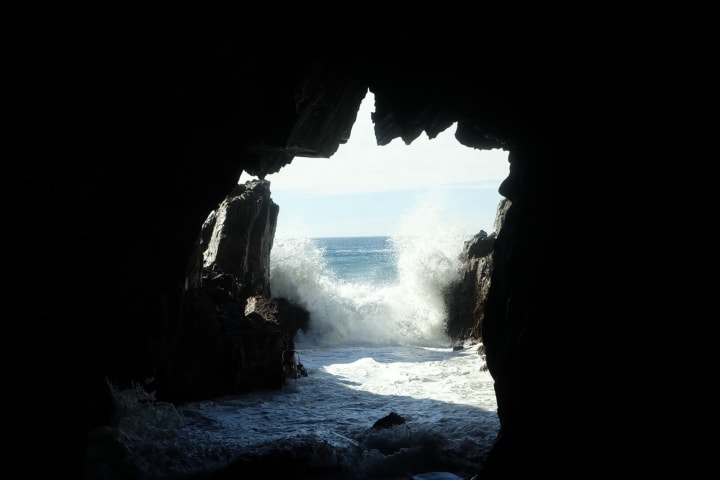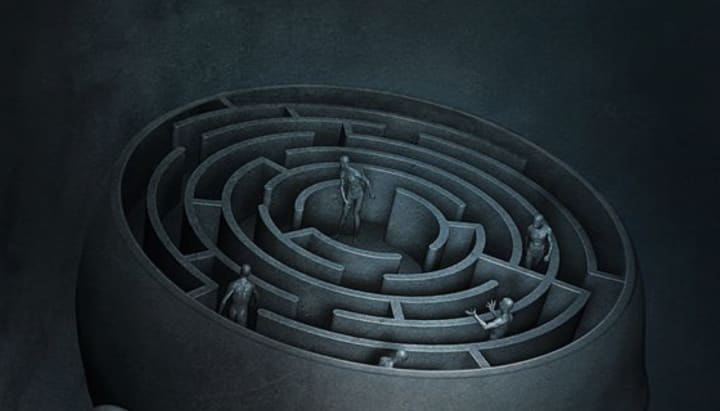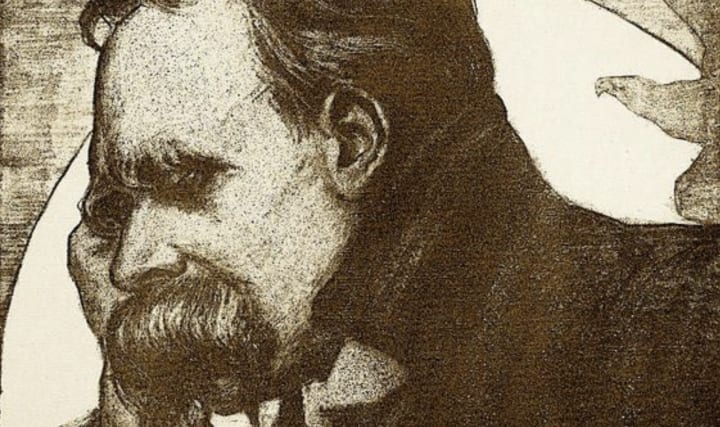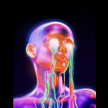Ideology and the Unknown
The cracks in our present-day ideological system and what it means for humanity

The worst feeling in the world is having a question and being powerless to its answer. It's this strange feeling of incompetence, mixed with unease and curiosity that leaves you entirely empty on the inside. There is so much we don't even realize we don't know. These are things we'll eternally debate and for good reason.
For example, the idea of justice. You think you know what justice is, but really, you only understand what justice means to you.
For every person who believes in your notion of justice, there's another who'll shamelessly believe in the opposite.
That's not to say you're wrong or they're right, but that's my point. There is no right or wrong because we simply don't know. It's not simple math and there's no clear-cut definition of what true justice looks like. We pick up whatever pieces of knowledge we're given and make some distorted idea in our heads. We follow that because it is so much better than having the question and being powerless to its answer.
The Unknown

Our dominating ideological system is meant to serve as a framework for humanity. It aims at answering the questions we're seemingly powerless to.
I'd define the unknown as anything and everything we're still searching the answer for. It's the stuff that's hard to explain. The abstract, intangible layers of humanity that we'll definitely experience, but will never quite understand. As hard as we try, there is no concrete answer:
- What happened before everything—like before the Big Bang, before whatever universe existed beforehand— How did anything come to be? My mind can't conceptualize the starting point (and I mean the real starting point of everything)
- What is real justice and how does it truly play out?
- What does true love look like?
- What is happiness? How does one come to truly attain it?
Once upon a time, religion would answer all these questions in the blink of an eye. But the Age of Enlightenment opened the world's eyes and changed everything.
Humanity
On some level, happiness has to be subjective, right? There are so many self-help books, titled something along the lines of "How To Be Happy: The Power Of [insert surface level mindset strategy here]", and I'm sure it's helped loads of people out there. But it doesn't answer my question, and there is no book out there that will universally lead everyone to happiness. Some people don't even believe in happiness!
Happiness is a question and we are powerless to its answer. It'll come to you through some abstract sequence of events that will be entirely unique to you, your situation and your environment, but it's not something that's written and understood in any concrete sense.
When it happens, you'll know but until then, you're grasping at straws and hoping. We're somewhat powerless to that deepest level of happiness that we're ultimately searching for, whether we're aware of it or not.

I don't know if this has always been the case or if it's just worsening now, but there's a pattern here that's hard to miss. Our prior notions of supposedly concrete ideas, like justice or happiness or love, are all breaking down at once. There's just not enough out there to justify our ideas as true, concrete knowledge. Different ideas float around an unknown subject and we're all hoping that our individual ideas are the real truth.
The only way we deduce the real truth about our ideas is through trial and error. It's experience that helps those ideas evolve, but what if our ideological systems end up destroying us in the process?
There's no concrete framework to organize the ideas that help us make sense of the unknown. We're left astray, facing the consequences of being powerless to the true answer.
Take love for example: If you grew up in the age of romanticism, your idea of love has grown from those pieces of media. Even if your idea of love isn't a direct reflection of romanticized ideas, the roots of your ideas about love are soiled in romanticism. And romanticism was meant to be a fantasy, an escape, an ideal.
If your partner never engaged in romantic films or writing, they're probably going to have a different perspective on what true love looks like.
I will agree that one's experience of love is subjective, but the disparity between each individual's definition of love grows larger when it becomes unclear what true love really looks like. With the various contradicting representations of what love "should look like" on the internet, it becomes clear that love is just a question and we're all just grasping at straws.

Justice is another one. Our ideas of justice could be influenced by the media, but that's influenced by the state of our political environment, which is ever-changing and a chaotic mess by nature (at least in North America). What was true 50 years ago isn't true now, so then what is the truth? Will "the truth" right now contradict our truth 50 years from now? Our ideas of justice are probably going to keep changing, because what we're seeing around us is constant, unstoppable change at a rapid pace.
The ideas that once seemed concrete are breaking down with it. That's not a horrible thing, because even I agree that things need to change.
Hear me out, though: We're clinging onto our own, personal ideological systems for dear life, doing anything we can to protect the answers we've deciphered for ourselves. We do this without realising that we are truly powerless to the actual answer.
Let there be light! Or darkness, or...who even knows anymore
Ideology is tricky that way. It's a system. An ideological system depends on the concreteness of its ideas and if one starts to crack, the rest begins to crumble.
The best way to understand this is by understanding the fall of religion, better known as the death of God. After the Age of Enlightenment, the once-concrete ideas of religion started to crumble, and soon enough, the whole thing came crashing down.
Similarly, if we don't fill in the cracks of our ideological system in time, then everything will come crashing down.
It's that feeling of being lost that keeps creeping up on us, and with a crumbling ideological system, there's nothing left to hold on to. We're stuck grasping at straws and learning from the consequences.
So that begs the question, how did the concept of ideology even come to exist?
How the concept of ideology was born
Is our dominating ideological system crumbling? Has it always been crumbling?? Is it strong enough to withstand the test of time (or at least till the end of my lifetime)??? To properly answer that, we should briefly go over the transformation of our ideological systems, and keep this primarily focused on the Western world.
The term ideology was coined in 1796 as the "science of ideas", a product of philosophy. The infamous Decartes opened the gates to the philosophical world once again somewhere around the 1500s, so let's start there:

We had great, hyper-theoretical thinking from modern philosophers like Karl Marx, Immanuel Kant, David Hume, and my all-time favourite, Nietzche. These guys sniffed out the fall of our religion-based ideological system before the worst of it even unfolded! It keeps getting worse naturally, but their words are universally praised and equally scorned for being able to decipher each little crack and come to some variation of their own solution.
Born from the Enlightenment, these philosophers paved the path to a new way of conceptualizing the world. These were the modern day, walking self-help books that aimed to readdress the problems in society and humanity.
People mark the end of the Enlightenment era with Kant's death, so somewhere around the beginning of the 19th century. A lot of what we see today is a product of Enlightenment thinking. Our ideological frameworks draw from these ideas: prioritizing logic and reasoning, the pursuit of knowledge, individual rights, equality and justice. I used to think I was original with my ideologies, but they're primarily influenced by the modern thinkers of the Enlightenment Era.
That's the world we were born into, but it might be reaching its limits.
Words of Wisdom (ft. Friedrich Nietzche)
His most famous quote: "God is dead."
He was definitely right about that. The rapid decline of religion was spotted centuries ago, and that's exactly what happened. I mean, every other person I meet identifies as an aethiest (Nietzche was self-aware enough to acknowledge that the Enlightenment Era was largely at fault for the fall of religion). It's incredibly normalized to dismiss religion now. God is dead, so what's replaced it?
Well, the all-knowing Friedrich thought it would be more effective to replace the belief in God with the belief in oneself, to focus on our individual achievements. This is fairly in line with how individualistic our society has become. Heavy emphasis is placed on the individual and even on an ideological level, it's self-serving and most ideas are focused on the individual experience of one's life. Nietzche admitted that his philosophical thought had little concern for "the herd". He was an existentialist, after all. Being hyper-aware of your sole existence has to lead to an individualistic society.
"The snake which cannot cast its skin has to die. As well the minds which are prevented from changing their opinions; they cease to be mind."
We've got this strange ability to change. A lot of people think that it wears off over time, and sure, it might for some. It doesn't have to, though, because I find that people can change at any stage of life. We go through ups and downs, no matter where you are in life, and with every cycle comes change. You can't escape it, trust me. I've tried.

Our ideas about change lack optimism because on a basic level, we refuse to change where it matters. By where, I mean those who have the power to make real change. Visible change can only really happen with the help of everyone, including those in power.
That is a whole other world that I have no place in, nor any control over. It would be great to be in power, making what change I can, but the people in power are governed by their own ideological systems.
That said, the ideological systems that govern those in power seem to be imploding in on themselves. With limiting resources, climate change, deforestation, habitat destruction and a whole load of other awful issues that still exist, the ideological framework that allows these global issues to persist needs to change. If the people in power represent the "snake which cannot cast its skin", then our future isn't looking so bright.
The Death of the Modern Philosopher
What the modern philosopher lacks is an ability to appeal to the wealth-hungry eye.
The seeds of economic thought grew out of the works of philosophers like Adam Smith and John Stuart Mill. Economics was originally considered philosophy until the late 19th century, when it broke off to become its own science. Modern ideological frameworks served as a guideline for how the world developed during the industrial revolution. However, in the late 20th century, economists started to stray away from Philosophy of Economics.
They believed it to be redundant and irrelevant. So, with little regard for the philosophy behind economics, the world quickly developed to become what we see today.
Recently, economists have had to revisit the philosophy behind economics for good reason. Correlating with the declined use of the Philosophy of Economics is the increased presence of socio-economic issues. We've seen economic inequality, climate change, poverty, housing crises and much more happening all around the world, each closely tied with the economy. As a result, economists have to revisit the juncture between philosophy and economics, with the hopes of healing the issues that have resulted from a poorly-handled economy.
We rely on the economy as much as the economy relies on us.
When we strayed away from the Philosophy of Economics, we had to establish a different ideological framework that would help us manage and define the connections between the economy, social class, markets, and, most importantly, our role within this intricate system.
What happens if that crucial part of our dominating ideological framework begins to crack?

The current state of our economy is a product of grasping at straws and hoping for the best. We created ideas that ended up creating more problems, many of which backfired on our own economy.
The only way the world really learns if our ideas are true is through experience, trial and error and facing the consequences of acting on those ideas. Well, most of us are certainly and unfairly facing the consequences.
Ideology is meant to help seal the cracks, answer the questions we're hopeless to, and provide a guideline to live and act by.
The ideologies that once governed our political and economic environments are backfiring on themselves, leaving us to question the entire dominating ideological system.
The cracks have begun to form.
What present-day ideology lacks
What present-day ideology lacks is an awareness for life, the true experience of living.
Mark Carney, the Former Governor of the Bank of England, travelled deep into the trenches of the Economy of the United Kingdom, and surprisingly came out alive (and with valuable insight)!
In his BBC podcast How We Get What We Value, he talks about how we've replaced our humanistic values with market-oriented values.
Overtime, society has slowly fallen into a habit of prioritizing the monetary value over the moral or humanistic value of something.
Mark Carney believes that the consequences of this shift from moral to monetary values has led to crises that affect the economy, individual lives and the environment.
We're moving towards an era that values personal exchange over life itself. It's easy to forget and aim for the profit in anything, whether that's monetary profit, social profit, or whatever else you deem admirable and worth the cost (literally and metaphorically). If you look close enough, there's a profit somewhere in nearly everything and that's not necessarily a bad thing. We all crave acceptance, validation, happiness, justice, enough wealth to live peacefully and a purpose/goal to work towards.
It only gets messy when our ideological system, how we approach life, how we see others, how we treat and regard ourselves, how we view purpose and how we perceive living, becomes distorted.
Nietzche's greatest challenge

Whoever fights monsters should see to it that in the process he does not become a monster. And if you gaze long enough into an abyss, the abyss will gaze back into you.
The first part of this quote is quite simple: Choosing to fight the ideological system in place means entering the world from which it was born. That change of environment will change you. There are people who try to fight the system, and end up becoming just as bad as the system in different ways.
The latter half proposes the real challenge that might have all of us stumped.
You're fighting the system in your head, everyday. The unanswerable questions, the cracks in ideology. Whenever you look out into the world and really look, you enter the abyss.
Nietzche's greatest challenge was being able to look into the abyss as a free spirit without letting it erode you from the inside out. That is, to look into the void without becoming a void. He states that it could quickly push one into nihilism.
We're incredibly emotional creatures who're constantly exposed to the suffering in our world, whether it be socially, economically, politically or psychologically. It's a miracle that our entire population hasn't turned into a nihilistic mob (yet).
For those of you who look long enough to realize the bad parts about our world,
For those of you who willingly stare into the abyss,
Don't let it destroy you.

Existentialism requires us to think outside of ourselves, and to view our existence in light of the great beyond. It means coming to terms with the reality of our existence, and all that encompasses it. Nietchze, the brilliant philosopher with a knack for existential thinking, marks this as his greatest challenge.
Viewing the whole scope of our existence, the vast beyond, without being destroyed by how empty it really is.
We are in an individualistic society that prioritizes freedom. We hope to be free spirits, but free spirits are also lost spirits, looking for anything that'll provide some sort of guidance. Free spirits are hyper-aware of the true emptiness of living, looking for anything that'll ease their minds about it. Thus, free spirits are responsible for designing an ideological framework that'll protect our freedom as much as our well-being.
Free spirits can fight the system, but we're warned to fight without becoming that which we're fighting.
It's not the freedom that's the problem, but figuring out how to navigate it.
I mean, we're stuck in cycles trying to find something to fulfill us. We need an ideological framework that will collectively guide us through the immense amount of freedom offered in the Western world, so we don't rot from the inside out. Human beings are an interconnected unit, and we're influenced by each other, whether or not you decide to be aware of it.
"The more I know, the more I realize I know nothing"
Socrates had it right, all the way back in 399-470 BCE. Philosophy teaches us how to navigate the unknown, but there will always be questions to which we may never have answers.
Cracks leave us lost in the unknown and powerless to the truth, but they also have the power to spark real and evolutionary change. As a society, we're coming to a standstill and every action, big or small, is significant. We never had to think more about our actions until now, and we all know it'll take time before we see the cracks heal completely, if they ever do.
The amazing thing about philosophy, however, is that it is priceless as it is timeless.
And, as Nietzche would put it,
Truth tends to reveal its highest wisdom in the guise of simplicity.
About the Creator
Aathavi Thanges
Disposing my thoughts one page at a time
Enjoyed the story? Support the Creator.
Subscribe for free to receive all their stories in your feed. You could also pledge your support or give them a one-off tip, letting them know you appreciate their work.






Comments (1)
This is an incredibly good article, articulating most eloquently things I have clumsily mulled over for years. You are to be commended for that, Aathavi. But I fear I have spent too long in that "Dark Night of the Soul", staring into the abyss of a never-ending evanescence. The complexities of the human heart, mind & soul are so great & capricious, our ideologies require constant vigilance not simply to maintain them but more importantly to make or keep them whole. The death of God is not a commentary against transcendence but rather of religious institutions & our attempts to contain & define that which can be neither. It is as I have long maintained, that the institution of the Church, as vital as it might be for carrying forth the memory of the Gospel, is at the same time antithetical to it. For the Gospel is simple. God loves you & there's nothing you can do to change that. God's grace is always for you. And all that God asks or desires from us is that we afford one another the same courtesy. There are no boundaries. No one gets left out. No time limit or expiration date to this free gift of God. But institutions have to define themselves by creating boundaries, deciding who is in or out, right or wrong, true or false. The Gospel recognizes that we are all of those things, each & every one of us as well as all of us together, at one & the same time. Constant vigilance is required, continuously reminding ourselves of our common humanity. There will be ebbs & flows all through our history, times when we remember that & times when we forget. The valleys & peaks may be sometimes deeper or more ascendant, but we will abide. Until we don't. Whether that be by ascending to the transcendent or descending into irreversible destruction. Yet for me, that dark night has been so interminable, the abyss so encompassing, the good I have yet to do seems infinitesimal & my nihilistic fading out uncontestable. In other words, I'm weary, worn out, exhausted & with virtually nothing left to contribute. But your article allows me to glimpse the beginning of a dawn yet to be.